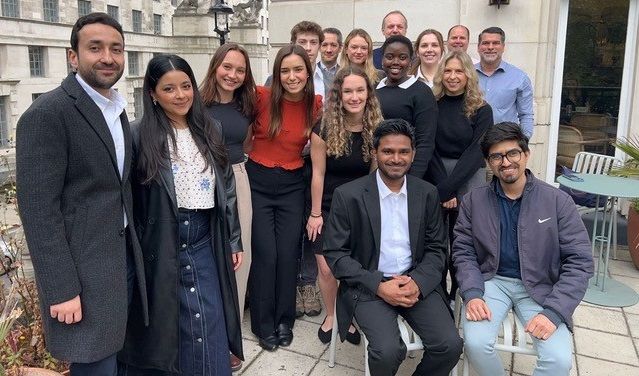University links with Ministry of Defence for mission-driven entrepreneurship

This year the Centre for Enterprise and Entrepreneurship Studies embarked on a new experiential learning partnership with the national charity, Common Mission Project UK.
Leeds University Business School and the Centre for Enterprise Studies took on this challenge to develop intelligent solutions to government challenges.

Through this module, led by Dr Richard Tunstall and Dr Peter Gittins, two teams of master’s students were presented with organisational problems provided by senior leaders at the UK Ministry of Defence. Drawing on the Lean Startup model developed by Steve Blank at Stanford University, the students interviewed over 50 stakeholders across government, science and industry to develop their solutions through minimum viable products (MVPs). Both teams also committed time to site visits to work directly with army and naval personnel who were directly experiencing the challenges set.
Richard Tunstall said:
"The teams not only showed how deeply they had understood the problems but further provided innovative solutions that would provide meaningful improvements for the beneficiaries. Over the 14 weeks the students showed the power of international collaboration to make real world impact."

During the module, delivering the new HELIX student innovation hub, students learnt from a host of guest speakers including expert entrepreneurs, a historian from Howard Greens Museum, consultants from KPMG and the regional innovation partner of the UK Defence and Security Accelerator.
Emma Parsons, Programme Manager at Common Mission Project UK said:
"Working with the University of Leeds to deliver the Hacking for MOD course is an exciting partnership for us at Common Mission Project. This collaboration empowers students to tackle pressing defence and national security issues and brings fresh perspectives and ideas to the forefront of these critical challenges."
"The student teams at Leeds were incredibly impressive, rapidly gaining knowledge in their problem areas and delivering innovative solution ideas. We look forward to the future where we will further develop our partnership with the University of Leeds."

One team worked on a challenge around a human resource management challenge from the Royal Navy which was also provided to students on the Innovation for Defence course at William and Mary in the USA by the US Navy. During the programme, the team from William and Mary visited the University of Leeds to continue their own research. Both teams then travelled to London together to present their ideas to the defence innovation accelerator, London Tech Bridge, at Westminster.
The students taking part in the challenge found it interactive and a wonderful experience as part of their course:
"I loved having access to an interesting challenge where I can contribute good ideas to solve it, and gaining direct experience that allows me to learn and grow my skills quickly."
"I found the interactive classes, firsthand learning experience, and concept of problem solving itself to be the highlight module in my degree."
By the end of the course the teams not only showed how they had deeply understood the problems they had been set, from talent development to food logistics, but further provided in-depth ideas for solutions which brought together app - based solutions using AI, while outlining on meaningful improvements for beneficiaries and the steps needed to implement them.
Michael Holman, Scientific Advisor at British Army Headquarters said:
"I would like to congratulate the students for their efforts. Throughout the project they demonstrated excellent enthusiasm, open-mindedness and curiosity and never seemed to be deterred by setbacks. These are all valuable characteristics in life generally but also in commerce and research!"

Over 14 weeks the teams created, critiqued, pivoted, and pitched showing the power of international collaboration and impactful experiential learning. The teams illustrated how working together, students can use their knowledge from their studies to make real - world impact.
